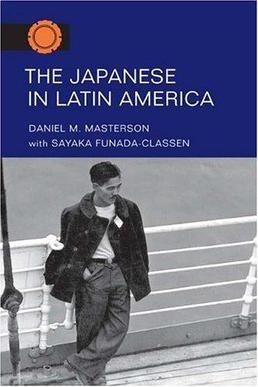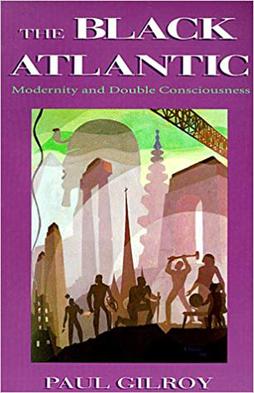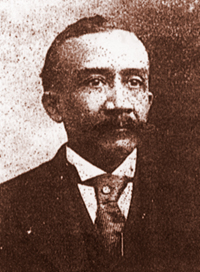The masculine term Latino, along with its feminine form Latina, is a noun and adjective, often used in English, Spanish, and Portuguese, that most commonly refers to United States inhabitants who have cultural ties to Latin America.

Black studies or Africana studies, is an interdisciplinary academic field that primarily focuses on the study of the history, culture, and politics of the peoples of the African diaspora and Africa. The field includes scholars of African-American, Afro-Canadian, Afro-Caribbean, Afro-Latino, Afro-European, Afro-Asian, African Australian, and African literature, history, politics, and religion as well as those from disciplines, such as sociology, anthropology, cultural studies, psychology, education, and many other disciplines within the humanities and social sciences. The field also uses various types of research methods.
Latino studies is an academic discipline which studies the experience of people of Latin American ancestry in the United States. Closely related to other ethnic studies disciplines such as African-American studies, Asian American studies, and Native American studies, Latino studies critically examines the history, culture, politics, issues, sociology, spirituality (Indigenous) and experiences of Latino people. Drawing from numerous disciplines such as sociology, history, literature, political science, religious studies and gender studies, Latino studies scholars consider a variety of perspectives and employ diverse analytical tools in their work.

Robin Davis Gibran Kelley is an American historian and academic, who is the Gary B. Nash Professor of American History at the University of California, Los Angeles (UCLA).

Héctor Tobar is a Los Angeles author, novelist, and journalist, whose work examines the evolving and interdependent relationship between Latin America, Latino immigrants, and the United States. In 2023, he was named a Guggenheim Fellow in Fiction.
Jeff Biggers is an American Book Award-winning historian, journalist, playwright, and monologist. He is the author and editor of ten books. His most recent nonfiction book, In Sardinia: An Unexpected Journey in Italy, is a cultural history and travelogue of the island. Biggers stresses of an approach of historical storytelling he calls "re-storification," the process of unearthing and forging new stories, rituals, and gatherings that recover the withered or denied strands of history and reshape its continuum between the past and present.
Giannina Braschi is a Puerto Rican poet, novelist, dramatist, and scholar. Her notable works include Empire of Dreams (1988), Yo-Yo Boing! (1998) and United States of Banana (2011).
Richard Price is an American anthropologist and historian, best known for his studies of the Caribbean and his experiments with writing ethnography.

Yo-Yo Boing! (1998) is a postmodern novel in English, Spanish, and Spanglish by Puerto Rican author Giannina Braschi. The cross-genre work is a structural hybrid of poetry, political philosophy, musical, manifesto, treatise, memoir, and drama. The work addresses tensions between Anglo-American and Hispanic-American cultures in the United States.
Latino literature is literature written by people of Latin American ancestry, often but not always in English, most notably by Mexican Americans, Puerto Ricans, Cuban Americans, and Dominican Americans, many of whom were born in the United States. The origin of the term "Latino literature" dates back to the 1960s, during the Chicano Movement, which was a social and political movement by Mexican Americans seeking equal rights and representation. At the time, the term "Chicano literature" was used to describe the work of Mexican-American writers. As the movement expanded, the term "Latino" came into use to encompass writers of various Latin American backgrounds, including Mexican, Puerto Rican, Cuban, and others.

The Japanese in Latin America is a 2004 book published by the University of Illinois Press about Japanese Latin Americans. The author is Daniel Masterson, while Sayaka Funada-Classen gave research assistance related to the Japanese language. The book discusses all of the major Japanese populations in Latin America and some other groups of Japanese diaspora who are not as well known. The Japanese populations of Argentina, Bolivia, Brazil, Chile, Colombia, Paraguay, Peru and Uruguay in South America, Cuba and the Dominican Republic in the Caribbean, Central America, and Mexico are all discussed in this book.
Latinx is a neologism in American English which is used to refer to people of Latin American cultural or ethnic identity in the United States. The gender-neutral ⟨-x⟩ suffix replaces the ⟨-o/-a⟩ ending of Latino and Latina that are typical of grammatical gender in Spanish. Its plural is Latinxs or Latinxes. Words used for similar purposes include Latin@, Latine, and the simple Latin. Related gender-neutral neologisms include Xicanx or Chicanx.
Lucha Corpi is a Chicana poet and mystery writer. She was born on April 13, 1945, in Jaltipan, Veracruz, Mexico. In 1975, she earned a B.A. degree in comparative literature from the University of California, Berkeley. In 1979, she earned an M.A. in comparative literature from San Francisco State University. Corpi's most important contribution to Chicano literature, a series of four poems called "The Marina Poems", appeared in the anthology The Other Voice: Twentieth-Century Women's Poetry in Translation, which was published by W. W. Norton & Company, in 1976 (ISBN 9780393044218).

The Black Atlantic: Modernity and Double Consciousness is a 1993 history book about a distinct black Atlantic culture that incorporated elements from African, American, British, and Caribbean cultures. It was written by Paul Gilroy and was published by Harvard University Press and Verso Books.
Paul Ortiz is an American historian. Ortiz is a professor of labor history at Cornell University and was formerly the Director of the Samuel Proctor Oral History Program at the University of Florida.

An Indigenous Peoples' History of the United States is a non-fiction book written by the historian Roxanne Dunbar-Ortiz and published by Beacon Press. It is the third of a series of six ReVisioning books which reconstruct and reinterpret U.S. history from marginalized peoples' perspectives. On July 23, 2019, the same press published An Indigenous Peoples' History of the United States for Young People, an adaptation by Jean Mendoza and Debbie Reese of Dunbar-Ortiz's original volume.

As a result of the emancipation of slavery in the United States, African Americans sought to challenge slavery in other parts of the hemisphere notably Cuba, and were frustrated by the decision of President Ulysses S. Grant to take a neutral approach towards the ongoing revolution in Cuba that was fought to overthrow slavery in the Spanish territory. Aware of the multiple Cuban exile revolutionary and political clubs organized by Cubans in New York during the nineteenth century, in 1872 African American men organized a club in support of ending slavery in Cuba and gain official recognition from the United States that the insurgents were legitimate belligerents. As a result, the Cuban Anti-Slavery Committee, first convened in December 1872 at the Cooper Institute in New York City.Samuel R. Scottron led the Committee and organized the event, while the Reverend Henry Highland Garnet served as the Committee's secretary and keynote speaker.

The term Chicanafuturism was originated by scholar Catherine S. Ramírez which she introduced in Aztlán: A Journal of Chicano Studies in 2004. The term is a portmanteau of 'chicana' and 'futurism'. The word 'chicana' refers to a woman or girl of Mexican origin or descent. However, 'Chicana' itself serves as a chosen identity for many female Mexican Americans in the United States, to express self-determination and solidarity in a shared cultural, ethnic, and communal identity while openly rejecting assimilation. Ramírez created the concept of Chicanafuturism as a response to white androcentrism that she felt permeated science-fiction and American society. Chicanafuturism can be understood as part of a larger genre of Latino futurisms.

The Jakarta Method: Washington's Anticommunist Crusade and the Mass Murder Program that Shaped Our World is a 2020 political history book by American journalist and author Vincent Bevins. It concerns U.S. government support for and complicity in anti-communist mass killings around the world and their aggregate consequences from the Cold War until the present era. The title is a reference to Indonesian mass killings of 1965–66, during which an estimated one million people were killed in an effort to destroy the political left and movements for government reform in the country.
Lorgia García Peña is an ethnic studies scholar, activist, and professor at the Effron Center for the Study of America and the department of African American studies at Princeton University. She formerly served as Mellon professor of studies in race, colonialism, and diaspora at Tufts University from 2021 to 2023. She became a subject of national attention after being denied tenure at Harvard University, where she taught from 2013 to 2021. She is the author of The Borders of Dominicanidad: Race, Nation and Archives of Contradiction and Translating Blackness: Latinx Colonialities in Global Perspective.










